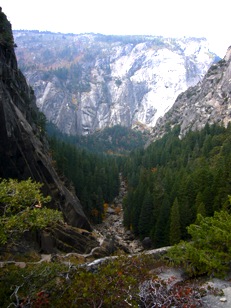Students are responsible for consulting the campus General Catalog and quarterly Schedule of Classes for University requirements, registration procedures and fee deadlines.
Our graduate degrees in Earth Science are primarily research degrees, rather than unit-count degrees. The course requirements are fairly minimal, the course selection tailored to your research interests, and the focus is squarely on the progress and quality of your research, monitored by your Principal Advisor, and assessed by your Advisory Committee during periodic reviews and gateway examinations.
Earning a Masters Degree in Earth Science
 The department offers a Master of Science in Earth Science. MS candidates follow an integrated course of study recommended by their placement committee and Graduate Advisor.
The department offers a Master of Science in Earth Science. MS candidates follow an integrated course of study recommended by their placement committee and Graduate Advisor.
To earn our MS degree, you must pass the Competency Exam, complete research in Earth Science under faculty supervision, prepare a satisfactory thesis, and fulfill the following course requirements: Earth 201A and 201B; Earth 260 each quarter while in residence; one unit of Earth 268 (Oral Presentation of Research); plus thirty additional units of electives and/or assignments from your placement committee (at least twenty of which must be from graduate courses). Note that Earth 260 and all 500-series courses (except 596) are excluded from these thirty course units.
Competency Examination
In the Competency Examination, you must demonstrate—by preparation and presentation of one research paper and by oral examination—competence in the field of specialization and the sciences relevant to your field(s) of interest.
MS students should arrange their studies to finish in not more than two years.
Questions not answered in the Graduate Handbook? Ask Yann Ricard, Graduate Program Coordinator, via email or telephone (805) 893-3329.
Earning a PhD in Earth Science
The department’s Ph.D. encompasses study in any of the branches of Earth Science.
To earn our PhD degree, you must pass the Competency and the Qualifying milestone exams, complete a body of research in Earth Science, prepare a satisfactory doctoral dissertation, present a thesis defense, and fulfill the following course requirements: Earth 201A and 201B; Earth 260 each quarter while in residence; one unit of Earth 268 (Oral Presentation of Research); plus thirty additional units of electives and/or assignments from your placement committee (at least twenty of which must be in graduate courses). Note that Earth 260 and all 500-series courses (except 596) do not count towards the thirty unit requirement.
Competency (“Comps”) Exam
For the Competency Examination, you must demonstrate—by preparation and presentation of one research paper and by oral examination—superior competence in the field of specialization and the sciences relevant to your fields of interest. The Competency Exam is a milestone exam. You must pass Comps to continue in the program.
Qualifying Exam (resulting in Advancement to Candidacy)
For your Qualifying Exam, you will discuss during a 20 minute presentation and 60-90 minute Q&A, a formal dissertation proposal describing your research as outlined in a written document submitted in advance to your committee. Distinct from the Comps, in which you described a single project, the Quals are where you present your plan for your entire thesis, including both work already completed and detailed plans for the remainder of your dissertation research. Quals are where faculty evaluate the feasibility of your proposed research projects, and help you reshape their design as needed.
The Qualifying Exam is normally taken during your third year (usually by the end of your third spring quarter). Students who arrive with an MS degree may—but are not required to—take their Qualifying Exam during their second year. Under extenuating circumstances, Quals may be taken during the following summer, but this exam must be completed by the first day of fall quarter to remain within degree normative time. Quals are a milestone exam. You must pass Quals to continue in the program.
Thesis Defense
For your thesis defense (held after a draft of your dissertation has been approved by your doctoral committee), you will present the principal findings of your thesis research in an open forum, then defend your conclusions in a closed door session with your doctoral committee.
We expect you to finish the Ph.D. within 3 to 5.5 years of full-time study. Students entering with a completed MA/MS degree are expected to complete their degrees in less time.
Questions not answered in the Graduate Handbook? Ask Yann Ricard, Graduate Program Coordinator, via email or telephone (805) 893-3329.
Optional Certificate in College and University Teaching
In addition to Teaching Assistantships, our department offers particularly motivated students a limited number of opportunities to teach entire courses as the Instructor of Record. Some students also pursue the Certificate in College and University Teaching
The Certificate in College and University Teaching (CCUT) is designed for doctoral students who wish to demonstrate superior competence and experience in preparation for teaching at the university or college level.
Awarding of the CCUT requires (i) participation in all required TA training programs and events, (ii) completion of a CCUT approved course that encompasses college-level pedagogy, (iii) completion of an activity aimed at improving instruction with technology (a classroom project, research-based discussion, or research paper), (iv) teaching a course as Instructor of Record, and (v) submission of a satisfactory portfolio describing and reflecting upon the above requirements. For more information, see here.
Optional Doctoral Emphases
You can enrich your doctoral program with any of three multidisciplinary emphases offered in collaboration with sister departments.
Climate Science and Climate Change
The PhD dissertation of students participating in this emphasis needs to have a strong focus in Climate Sciences and/or Climate Change.
Fulfillment of the emphasis requires presenting your research in the GEOG 288LC Geography in Climate Research Meetings seminar series and taking six courses: GEOG 287 Seminar in Climate Science and Climate Change, GEOG 280 Geography Climate Research Meetings, two elective courses in the Physical Sciences, and two elective courses and two elective courses in the social sciences. This emphasis is offered in collaboration with the Departments of: Economics, Environmental Science and Management, Geography, and the Interdepartmental Graduate Program in Marine Science. More information is provided here.
Computational Science and Engineering
Going from application area to computational results requires domain expertise, mathematical modeling, numerical analysis, algorithm development, software implementation, program execution, analysis, validation, and visualization or results. CSE addresses these issues. Although CSE includes elements from computer science, applied mathematics, engineering and science, it focuses on the integration of knowledge and methodologies from all of these disciplines and, as such, is a subject distinct from any of them.
Fulfillment of the emphasis requires presentation of a research paper, writing and defending a dissertation in CSE and completing six courses in the three-part core sequence. Part 1, Numerical Methods requires three courses from the ECE 210 A-B-C D series consisting of Matrix Analysis and Computation and Numerical Simulation and Numerical Solutions of Partial Differential Equations Finite Difference Methods and Numerical Solutions of Partial Differential Equations Finite Elements Methods; Part 2, Parallel Computing requires one course from the CMPSC 240 A-B Applied Parallel Computing series; Part 3, Mathematics requires both courses from either the MATH 214 A-B Ordinary Differential equations and Chaotic Dynamics and Bifurcation Theory series, the MATH 215 A-B Partial Differential Equations and Fourier Series and Numerical Methods series, or the CH E 230 A-B Advances in Theoretical Methods in Engineering series. The PhD dissertation must be centrally focused on a question emerging from Computational Science and Engineering.
This emphasis is offered in collaboration with the departments of Chemical Engineering, Computer Science, Ecology Evolution and Marine Biology, Electrical and Computer Engineering, Mathematics, and Mechanical Engineering. For more information, see here.
Environment and Society
This emphasis encompasses the diverse, dynamic, and complex interactions between human societies and their biophysical surroundings, over time and space. Environment and Society includes environmental change, environmental politics, and environmental problems and solutions, as well as critical theories of environmental thought, perception, representation, and action. This emphasis fosters the integrative thinking and problem-solving skills essential for leaders of the next generation of environmental scholars in their respective fields
The PhD dissertation of students in this emphasis must include some aspect of interdisciplinary environmental studies as a component of their dissertation.
Fulfillment of the emphasis requires completing four courses: Env S 200 Core Seminar in Environment and Society, plus three elective courses in an area of specialization outside of your department and/or discipline. You may design your own elective curriculum, with proper justification, or choose them from a standing list. Consistent attendance at the annual symposium, where beginning and continuing students present their research, is also required.
This emphasis is offered in collaboration with the Departments of Anthropology, Environmental Science and Management, Chicana and Chicano Studies, East Asian Languages and Cultural Studies, Ecology Evolution and Marine Biology, Education, English, Feminist Studies, Film and Media Studies, Geography, Global Studies, History, Interdeparmental Graduate Program in Marine Science, Linguistics, Political Science, Psychology & Brain Science, and Sociology. For more information, see here.
